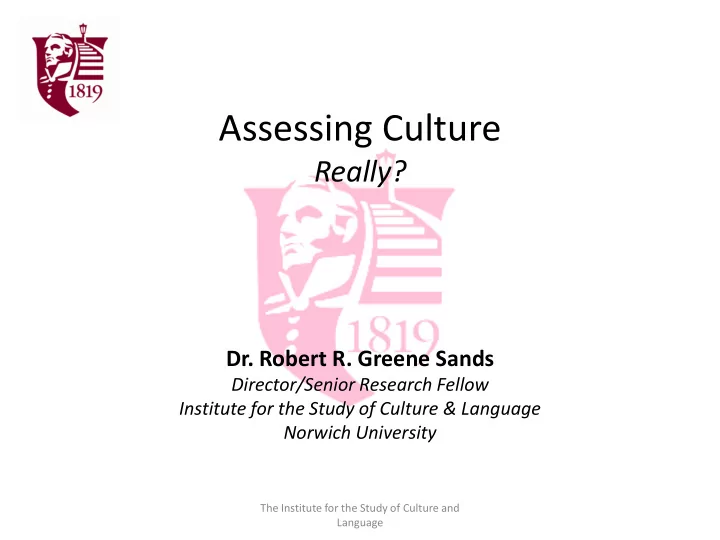

Assessing Culture Really? Dr. Robert R. Greene Sands Director/Senior Research Fellow Institute for the Study of Culture & Language Norwich University The Institute for the Study of Culture and Language
How do you get to the Met? Robin Williams, 1986 The Institute for the Study of Culture and Language
He Gets Culture…. Culture is an outdated term • Too many definitions describe a people, a list of things/behaviors, abilities, skills, capabilities, knowledge, and affect • Good for programming, good for categorizing for departments, organizations, agencies • But when we say, “we are going to add culture to a curriculum,” just what are we adding? – And as all good educators, we should assess the culture we insert in our curriculum… what exactly are we assessing? • When we say we need to add culture to our strategy or mission, what are we adding? The Institute for the Study of Culture and Language
Culture A shared mix of attitudes, behavior and meaning predicated on a foundation of beliefs • Forms a collection of people • A process for adapting and guiding behavior • Acts as a repository for knowledge, beliefs and values • Has universal applications The Institute for the Study of Culture and Language
Culture has become more than that It has become an ambiguous amalgamation of knowledge, skills, abilities and attitudes that has been termed critical by the DoD • Cultural capabilities • Assessing these capabilities requires an array of methods – But none seem to be able to span KSAAs, and each only gets to a part of the story • Folds in many disciplines The Institute for the Study of Culture and Language
Culture “Components” • Culture-general knowledge • Culture-specific knowledge – Regional Expertise • Interpersonal skill-based competencies • Intrapersonal enablers/personality traits The Institute for the Study of Culture and Language
Assessing? So…. • Are we assessing what we know about others and ourselves? • Are we assessing how well we interact with each other or different groups – skills? – We know it is not enough to “know.” We need to be able to act and interact • Are we assessing how well we are set up to be successful in interacting? • Are we assessing how successful we are at our mission? • And oh by the way, are we cursed with trying to measure it? The Institute for the Study of Culture and Language
The Answer? All of these components are critical to mission success • Cross-cultural competence (3C) – Learn and use cultural knowledge – Understand self/suspend bias – Discern and make sense of behavior – Effectively communicate and build relationships The ability to navigate in complex interpersonal situations, express or interpret ideas/concepts across cultures, and make sense of foreign social and cultural behavior The Institute for the Study of Culture and Language
Can we assess 3C as away to assess culture? • Metacognition/cognition – using knowledge - when and how to use particular strategies for learning or for problem solving – thinking • Motivation - attitudes, self- confidence, psychological and sociocultural adjustment, self-efficacy, empathy, acceptance of ambiguity, open-mindedness, emotional stability and flexibility • Behavioral/competence • Load - treatments to introduce affect, emotion, fatigue, or distraction to the assessment situation as “dynamic measurement,” past experience The Institute for the Study of Culture and Language
Many Models/Many Assessments • Many Models – Developmental Model of Intercultural Sensitivity, Developmental Model for 3C • Many Assessments – Intercultural Developmental Inventory (IDI), Global Competencies Inventory (GCI), Culture Intelligence Scale (CQS), Intercultural Adjustment Potential Scale (ICAPS), etc The Institute for the Study of Culture and Language
Assess the Assessment – Content validity refers to the extent to which evidence exists that a concept (e.g., 3C) is measured in its entirety without the inclusion of measurement of extraneous concepts – Criterion validity refers to the extent to which evidence exists for a meaningful relationship between a measure of a predictive concept (e.g., 3C), and measures of a relevant outcome (e.g., work performance) – Face validity refers to the extent to which a measure or item appears “at face value” to be an appropriate measure of the concept of interest. – Construct validity refers to the extent to which there is evidence that a measure of a concept (e.g., 3C) relates in a meaningful way to measures of similar (e.g., a measure of intercultural communication) or dissimilar (e.g., a measure of xenophobia) concept Van Driel mand Gabrenya, Instrumentation Challenges in Developing Cross-cultural Competence Models (2013) The Institute for the Study of Culture and Language
Thoughts to Consider When we say assess culture, do we know what we want assessed? What is the relationship between language and culture for development and for assessment, and how do they impact each other? When we say we want to add “culture” to the language curriculum, what are we adding? Are we humble enough to suggest there is something bigger? And far more complex? LREC? The Institute for the Study of Culture and Language
Can we get to the Met? Maybe Synergize language and culture to promote learning and performance • First attempt assessment – ILR intercultural communication skill descriptors • LREC learning in the classroom – coming in June Greene Sands and Greene-Sands, Cross-Cultural Competence for a Twenty- First-Century Military: Culture, the Flipside of COIN (Lexington Books, 2013) The Institute for the Study of Culture and Language
Recommend
More recommend